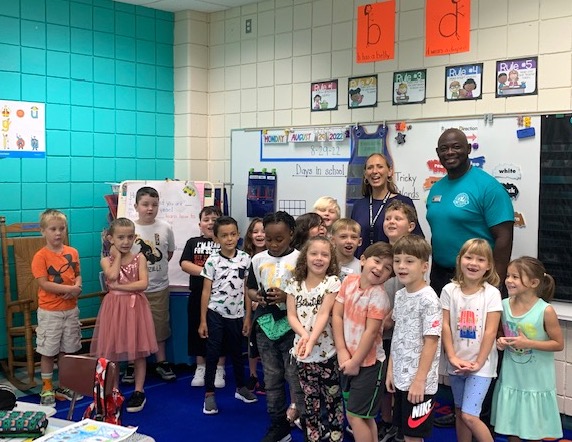As if a superintendent’s life isn’t busy enough, Lisa Witte’s idea of community engagement is volunteering for her local fire department and EMT service.

Why does she spend weekends taking emergency calls when she serves as superintendent of the Monadnock Regional School District superintendent during the rest of the week?
Witte says it’s because her father was a firefighter and she also felt like she wasn’t involved enough in other communities in which she’s lived. “I wasn’t involved in anything other than work,” says Witte, the 2022 New Hampshire superintendent of the year. “And it gives my dad and me something to talk about—every time there’s a call, I give him the lowdown.”
Recently, she responded to a water main break that flooded a house with hip-deep water. “I try to go to as many calls as I can to keep my skill sharp,” she says. Witte’s volunteer work at Peterborough Fire and Rescue is an example of how District Administration’s latest three superintendents to watch are putting community engagement and community health at the center of K-12 success.
Keeping track at the Capitol
Witte also spends a lot of time at the New Hampshire legislature advocating for public education. Because her district has joined other New Hampshire school systems in a lawsuit against the state over education funding, she has lately focused on other issues when she visits the state capitol. Lately, she has been tracking school vouchers and attempts to rewrite K-12 curriculum rules.
She is also a member of the state superintendents association’s legislative action group, which reviews bill proposals to determine the potential impacts on K-12. “I try to be a voice around other initiatives that seem to want to undermine the public school system,” she says. “But I also want to be supportive of efforts that are good for New Hampshire schools.”
Superintendents Summit
The District Administration Superintendents Summit offers cutting-edge professional development to school district superintendents and other senior education executives to inspire innovation and leadership excellence in K-12 education. Upcoming events in this series:
Nov 9 – Nov 11: Omni La Costa Resort & Spa, Carlsbad, CA
Dec 14 – Dec 16: Ponte Vedra Inn & Club, Ponte Vedra, FL
Within her district, building a positive climate has been an ongoing priority since she came to Monadnock SAU 93. “It starts with being approachable,” Witte says. “I want people to call me by my first name. I want folks to feel like they can reach out to me and talk to me about anything.”
She likes to connect with staff by asking about their families and finding ways to celebrate their achievements. And she always asks new hires what they do for fun. “I want people to have passions outside of work because that helps them focus on the profession and it prevents burnout,” Witte says. “I give people explicit permission to not be here at 8 p.m. doing lesson plans at their desk.”
She’s also handed out about 1,000 “Awesome Human” buttons in the district’s annual “#celbratemrsd” recognition program. Anyone in the community can be nominated for their role in a local success story. Witte has already given out more than 150 buttons already this year. “It’s not coming from me—it comes from peers recognizing peers and colleagues recognizing colleagues.”
She has also been helping to improve the climate at school board meetings. Seven or eight years ago, it was not uncommon for people to scream and fight at school board meetings that ran past 1 a.m. in the morning. Her work to change that image—by encouraging people to try each other more respectfully—has paid off in Monadnock’s board being named school board of the year. “I like to remind everyone that we’re all here for the best interest of kids,” she says. “If you feel yourself getting working up, just think what’s best for kids.”
‘A wonderful working relationship’

Jerry L. Oates, superintendent of Brunswick County Schools in North Carolina, bases his leadership philosophy on what he has dubbed Dr. Oates’s “Five Pillars of Leadership”:
- Treat people like people
- Take care of yourself and your family
- Ask for help
- Be the professional
- Work toward continuous improvement
“I believe that great leaders grow great leaders by empowering them and providing resources so they can push far beyond what they imagined they could do,” says Oates, the 2022-23 southeastern North Carolina regional superintendent of the year. “We are in the people business and leadership rests on relationships. Before a leader can garner trust from those they lead, they have to nurture a positive relationship, stay true to their word and model integrity.”
One of the achievements he’s most proud of is his district’s “very robust and active” Teacher Advisory Committee, which provides opportunities for central office staff and teachers to collaborate around policy and other initiatives. The teachers of the year from each of Brunswick County’s 20 schools are part of the committee, which meets once a month.

As for community engagement, the district has also forged “a wonderful working relationship” with Brunswick County’s board of commissioners. This is the first year of a four-year funding agreement that gives the district 36.5% of one of the county’s tax streams. “Lastly, I am proud of the fact that despite a global pandemic, our students’ proficiency on end-of-grade tests has improved over the last two years.”
Like most other educators, Oates ranks COVID as the toughest challenge of his career. The biggest hurdles were moving abruptly to virtual learning and ensuring that schools had enough teachers and substitutes at the height of the pandemic. Brunswick County was already a 1-to-1 district prior to the outbreak so every student had a device for remote instruction. “That was an eye-opening experience for everyone,” Oates said. “However, I do believe that there have been some great takeaways from that experience that have enhanced the way we educate students.”
More from DA: These 3 ‘disturbing’ safety concerns are at the top of mind for schools
In 2022-2023, he’s looking forward to a “normal” year and seeing students show growth on end-of-grade tests. A big initiative for the year is to train teachers and inform students and parents about standards-based learning and grading. “Any new initiative will be met with resistance, but I believe that with effective communication and training, we will be able to reach this goal,” he says.
Community engagement cuts costs
Gillian Chapman is superintendent of the Wyoming school district that serves Jackson Hole, a world-renowned ski resort. The community is surrounded by the towering Teton Range and offers top-notch skiing, hiking and rafting, among other outdoor activities. It also has one of the highest costs of living in the country. That, and a limited housing supply, and low-paying service jobs means many teachers, staff and families don’t stay in Teton County School District #1 long, says Chapman, Wyoming’s 2023 superintendent of the year.

“Families who live here sacrifice a lot—they sacrifice being a homeowner for cramped apartment living,” Chapman says. “We don’t have 5G internet or a lot other of the conveniences of living in a bigger city.”
On the other hand, the small community—which is home to some very affluent residents—has rallied around the schools. Various philanthropists and other organizations have taken community engagement to another level by raising $900,000 in scholarships for this school year’s 225 graduating seniors. “There’s a commitment to sending students off into the world knowing the entire community is there to support them,” Chapman says.
At the center of her leadership philosophy is what she calls “collective efficacy,” a belief that every school staff member should have a positive impact on student achievement by taking a whole child approach. A district mission statement is: “All third graders are readers and mathematicians, all eighth graders are writers, and all graduates are life ready.”
The district’s Jackson Hole High School is consistently ranked No. 1 in the state based on ACT scores, a test all 11th graders take regardless of whether they’re going to college or they are English learners or on IEPs. All high school students are also required to take at least one AP class because Chapman and her team believe that more rigorous coursework inspires a college-going mindset.
As a result, the district’s 98% graduation shows no gaps based on race or income. “We would rather aim really high than aim short and leave some students behind,” Chapman says.
Building employee housing is one of the district’s major ongoing community engagement initiatives. Property is scarce, as 98% of the land in Teton County is owned by the federal government, and a two-bedroom apartment can rent for $4,400 a month. The district is now using various plots of land to expand its high school and create housing. After completing construction on a new elementary school, the district converted eight mobile classroom trailers into two-bedroom homes and transferred them to another one of its properties as staff housing.
In November, the district will ask voters to approve a 1% sales tax hike that would generate $16 million to build 24 apartments on another district-owned parcel of land. “We are the largest employer in the community, so the strength of community and the strength of district are interconnected,” Chapman says. “If the school district isn’t successful, it really has an impact on a small community.”









